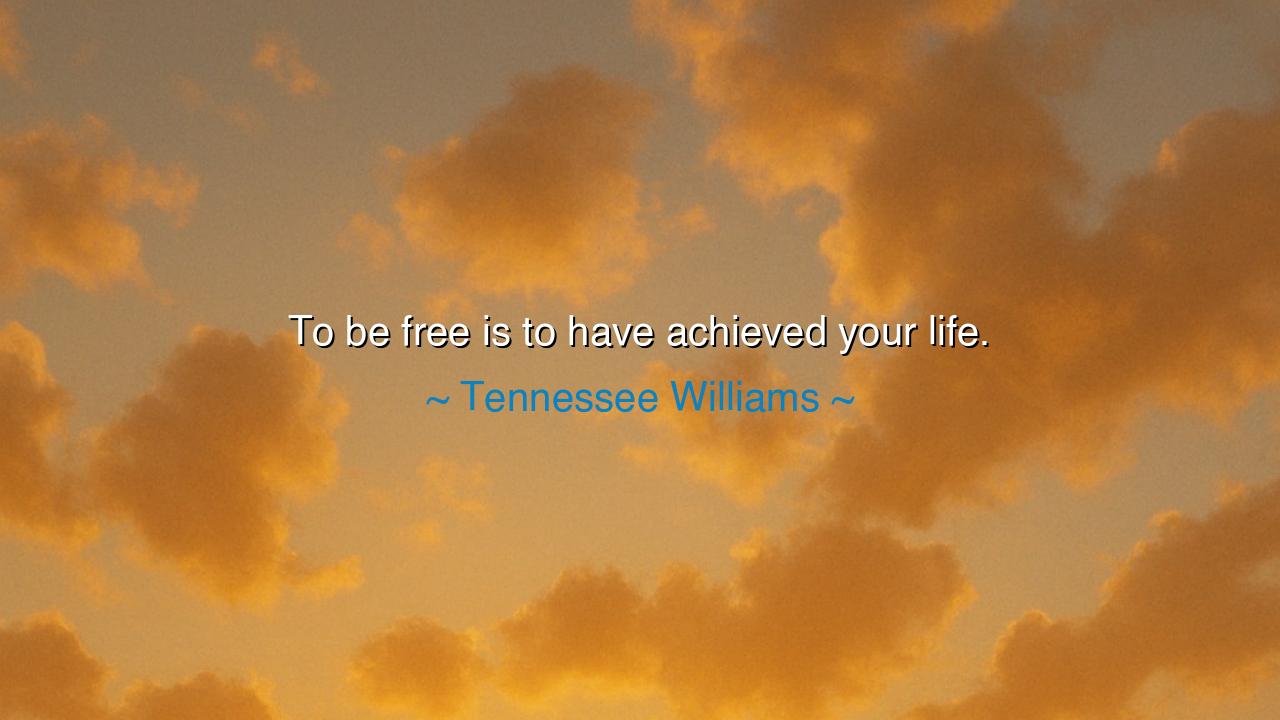
To be free is to have achieved your life.






"To be free is to have achieved your life." These words, spoken by the great Tennessee Williams, stir the soul and beckon us to reflect on the true nature of freedom. To many, freedom is a mere absence of constraint, a release from external forces that bind us. But Williams delves deeper, suggesting that freedom is not just about breaking physical chains or escaping oppressive forces. True freedom, he contends, is the achievement of life itself—a life lived fully, in alignment with one’s deepest truths, desires, and potential. Freedom is not simply granted; it is earned through the realization of one's destiny.
In the ancient world, freedom was often intertwined with the concept of self-realization and virtue. Socrates, the great philosopher, argued that the truly free man was not the one who could move without restriction, but the one who had mastered his own soul. A man who knew his own desires, controlled his own impulses, and sought knowledge and wisdom in every action was, in Socrates' eyes, the most free of all. To be free, according to the ancients, was to live a life governed by wisdom, not by external forces. The spiritual freedom they spoke of was not a flight from society or obligation, but an inner freedom found in discipline and virtue.
Consider the story of Alexander the Great, a ruler whose physical conquests were legendary, but whose true freedom came from his vision and self-understanding. Alexander’s ambition was driven not by a thirst for power alone, but by a desire to create a world united by common values and principles. His freedom was not just the freedom to conquer, but the freedom to shape the world according to his own vision. And yet, Alexander's own inner struggles and battles with his identity and purpose show that true freedom is not merely a result of external victories, but a victory over one's own inner turmoil.
In more recent times, the example of Nelson Mandela illustrates the profound truth in Williams' words. Mandela spent 27 years imprisoned, enduring physical hardship and oppression. Yet, in his heart, he remained free. His freedom did not lie in his ability to walk freely among the people, but in his capacity to maintain his vision of justice and his unwavering commitment to a greater good. Mandela’s freedom was the achievement of his life—the embodiment of his ideals, not despite the struggles, but because of them. It was through his sacrifice and resilience that he achieved the fullness of his life’s calling.
Freedom, then, is not an external state to be granted, but an inner realization to be attained. It is the ability to live authentically, to make choices that align with one’s own values, and to act in accordance with one's purpose. Williams suggests that we cannot truly be free until we have come into full ownership of our lives—until we have reached a place where we can stand before ourselves, unashamed and unburdened by fear or doubt. Freedom is the ultimate achievement, for it signifies a life lived on one's own terms, guided by wisdom and personal integrity.
Let us now take heed of this teaching, for it calls us to examine our own lives and our own freedom. Are we truly free, or have we allowed the expectations of others, the fears of society, or our own doubts to bind us? To achieve our life, as Williams teaches, is to break free from the chains of external influence and live according to our deepest convictions. We must ask ourselves, then: What is the purpose that drives us? Are we truly living in alignment with it, or are we merely existing in the wake of others' expectations?
The lesson, then, is clear: freedom is not a passive condition, but an active process of living with purpose, passion, and authenticity. It is achieved through self-realization and self-determination. Let us all strive to live as free beings, not bound by external forces, but empowered by our inner strength, and in doing so, we will have truly achieved our lives.






AAdministratorAdministrator
Welcome, honored guests. Please leave a comment, we will respond soon